Chinese Family Education 中国的家庭教育
中国式教育的利与弊
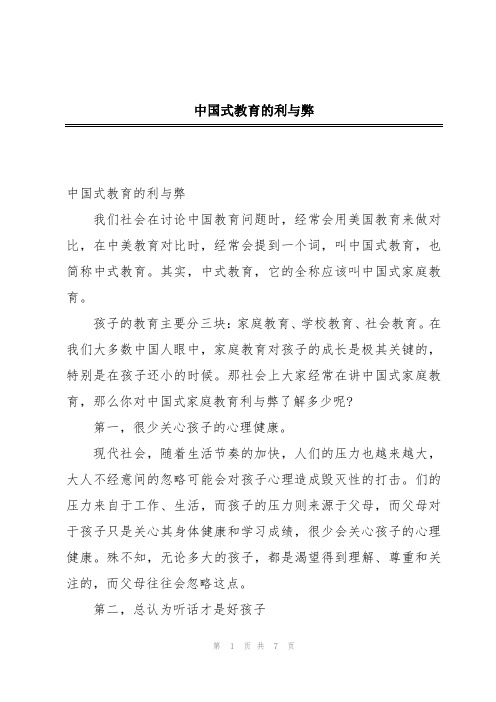
中国式教育的利与弊中国式教育的利与弊我们社会在讨论中国教育问题时,经常会用美国教育来做对比,在中美教育对比时,经常会提到一个词,叫中国式教育,也简称中式教育。
其实,中式教育,它的全称应该叫中国式家庭教育。
孩子的教育主要分三块:家庭教育、学校教育、社会教育。
在我们大多数中国人眼中,家庭教育对孩子的成长是极其关键的,特别是在孩子还小的时候。
那社会上大家经常在讲中国式家庭教育,那么你对中国式家庭教育利与弊了解多少呢?第一,很少关心孩子的心理健康。
现代社会,随着生活节奏的加快,人们的压力也越来越大,大人不经意间的忽略可能会对孩子心理造成毁灭性的打击。
们的压力来自于工作、生活,而孩子的压力则来源于父母,而父母对于孩子只是关心其身体健康和学习成绩,很少会关心孩子的心理健康。
殊不知,无论多大的孩子,都是渴望得到理解、尊重和关注的,而父母往往会忽略这点。
第二,总认为听话才是好孩子如果问:什么样的孩子才是好孩子?相信绝大部分的父母都会说:听话的孩子才是好孩子。
听话在不自觉间变成了评判好孩子的最高标准。
事实上,每个孩子都有自己不同的性格特点,有的孩子生性活泼,有的孩子天生文静、乖巧。
如果父母一味对待,很有可能就扼杀了孩子独有的个性和探索能力。
如果家长真想让孩子听话,那就要自己学习一些如何教育孩子的知识,不仅要懂得孩子的心理成长期,还要了解孩子的胜利成长期;孩子在不同时期的不同心理特征和生理特征等等。
这样才能了解孩子的能力世界,让孩子听话。
其实,中国式家庭教育虽然有很多弊端,但他不是一点利也没有,我们来说一说他的优点有哪些吧!一、棍棒底下出人才首先,棍棒底下出人才并不是说父母无故殴打孩子,而是说当他做了一些事或者犯了一些严重的错误时候,这个时候需给他教训也就是我们常说的给他长个记性,个人认为小孩子不会记住什么事情,如果你心平气和地跟他谈,又或者不管不问,那么会不会助长这种行为,而导致他长大后去社会上被别人狠狠教育。
有很多孩子,喜欢欺负别人,那么这样等他长大以后会不会因为这个而去打架斗殴,又会不会导致伤残,这样带来的就是一个家庭的毁灭。
浅谈中国式的家庭教育

浅谈中国式的家庭教育中国式的家庭教育,大都是望子成龙,望女成凤。
但现在的年青父母们,却忽略了自己教育孩子的一些坏习惯,下面我们就一起来慢慢做剖析,如果你没中一条,那就都算是好父母。
许多父母都希望把孩子送去最好的学校,接受最好的教育,拼尽全力给孩子创造最好的教育环境。
但是却往往忽略了父母才是孩子最好的老师。
父母的一言一行,都是在给孩子做榜样;家庭生活里的每个细节,其实都不是小节。
很多时候,父母为了保护孩子,避免孩子受伤,会做出许多越矩的行为。
殊不知,这样的行为对孩子的成长已经造成了伤害。
许多父母自己勤俭节约,孩子大手大脚。
做父母的自己生活节衣缩食,却无条件满足孩子的要求。
你以为这是爱孩子的表现,其实不然。
在金钱上放纵孩子,很有可能会让他们学会奢侈,不懂得回报,不懂得如何管理金钱。
爱孩子并不意味着要给他们最昂贵的,最重要的是合适。
从小教会孩子理财,懂得感恩和回报,真正了解节俭的道理,才是给孩子最好的礼物。
父母没有礼貌,孩子有样学样。
懂文明,讲礼貌是做人最基本的原则。
生活中,做父母的和别人相处时,如果经常有不礼貌的表现,孩子就会有样学样。
比如父母之间用词不礼貌,孩子对双方也会不礼貌,父母对长辈不礼貌,孩子看在眼里也会学着父母的对待方式。
一旦孩子养成了没礼貌的习惯,就会影响他在人际关系、在学业、事业上面的发展,让他们错失许多机会。
平日里,父母要审视自身的言行,做一个讲文明,讲礼貌的人,言传与身教是不可分割的两个部分看电视节目不分级,孩子易学坏。
做家长的和孩子一起看电视,这个场景几乎每个家庭都会出现。
为了图省事,很多家长会带着孩子一起看成人节目,却忽略了一个问题。
很多成人节目并不适合孩子,有些节目容易让孩子产生错误的认知,而且孩子的眼部发育尚未完全,和家长一起长时间看电视,辐射、强烈视觉和听觉刺激也会伤害到孩子,还有可能造成颈椎等骨骼发育。
我们要意识到,给孩子看节目或者玩电脑,一定要遵循孩子的发展习惯。
保证孩子接触到的内容是正面的、健康的。
中美家庭教育的比较
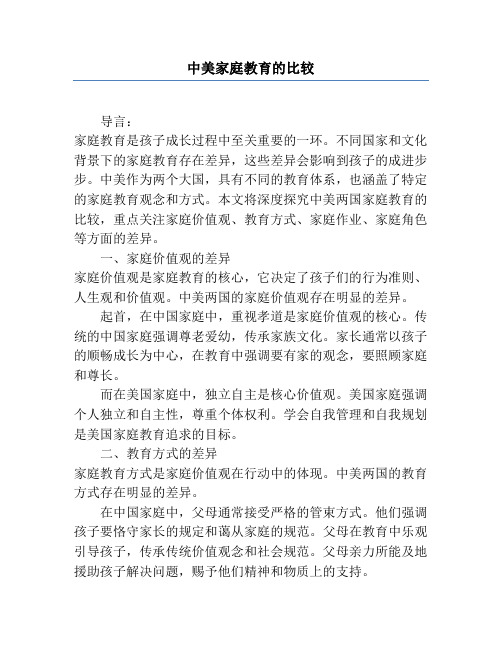
中美家庭教育的比较导言:家庭教育是孩子成长过程中至关重要的一环。
不同国家和文化背景下的家庭教育存在差异,这些差异会影响到孩子的成进步步。
中美作为两个大国,具有不同的教育体系,也涵盖了特定的家庭教育观念和方式。
本文将深度探究中美两国家庭教育的比较,重点关注家庭价值观、教育方式、家庭作业、家庭角色等方面的差异。
一、家庭价值观的差异家庭价值观是家庭教育的核心,它决定了孩子们的行为准则、人生观和价值观。
中美两国的家庭价值观存在明显的差异。
起首,在中国家庭中,重视孝道是家庭价值观的核心。
传统的中国家庭强调尊老爱幼,传承家族文化。
家长通常以孩子的顺畅成长为中心,在教育中强调要有家的观念,要照顾家庭和尊长。
而在美国家庭中,独立自主是核心价值观。
美国家庭强调个人独立和自主性,尊重个体权利。
学会自我管理和自我规划是美国家庭教育追求的目标。
二、教育方式的差异家庭教育方式是家庭价值观在行动中的体现。
中美两国的教育方式存在明显的差异。
在中国家庭中,父母通常接受严格的管束方式。
他们强调孩子要恪守家长的规定和蔼从家庭的规范。
父母在教育中乐观引导孩子,传承传统价值观念和社会规范。
父母亲力所能及地援助孩子解决问题,赐予他们精神和物质上的支持。
而在美国家庭中,父母更倾向于接受开放的教育方式。
他们重视培育孩子的创设力和自主性,鼓舞孩子表达自己的观点和理念。
美国父母更重视孩子与外界的互动,鼓舞他们探究和发现。
而在解决问题时,美国父母更倾向于接受引导和启发的方式,让孩子自己去沉思和解决。
三、家庭作业的差异家庭作业是同砚与家庭教育的重要环节,中美两国的家庭作业也存在差异。
在中国,家庭作业被看作是与学校教育紧密结合的一部分。
家长通常在孩子回家后打算一定的时间和场地给孩子完成作业。
他们会监督孩子的进修进展,援助他们解决进修中遇到的问题。
在中国,家长普遍认为孩子的进修效果是家庭荣誉感的体现,因此家庭作业被视为家庭教育的重要组成部分。
而在美国,家庭作业的重要性相对较低。
中美家庭教育的差异
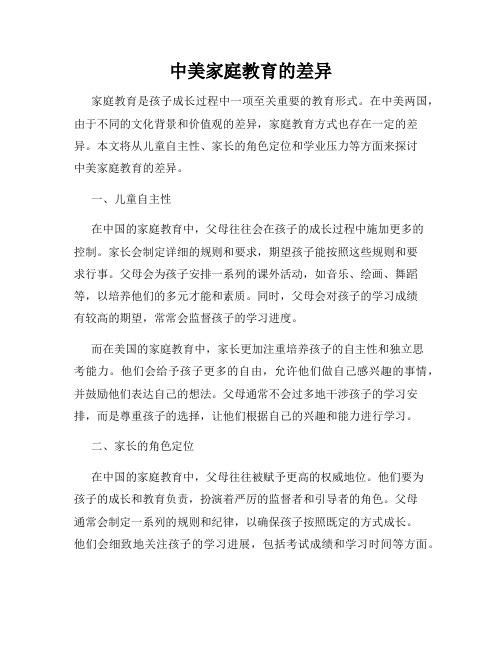
中美家庭教育的差异家庭教育是孩子成长过程中一项至关重要的教育形式。
在中美两国,由于不同的文化背景和价值观的差异,家庭教育方式也存在一定的差异。
本文将从儿童自主性、家长的角色定位和学业压力等方面来探讨中美家庭教育的差异。
一、儿童自主性在中国的家庭教育中,父母往往会在孩子的成长过程中施加更多的控制。
家长会制定详细的规则和要求,期望孩子能按照这些规则和要求行事。
父母会为孩子安排一系列的课外活动,如音乐、绘画、舞蹈等,以培养他们的多元才能和素质。
同时,父母会对孩子的学习成绩有较高的期望,常常会监督孩子的学习进度。
而在美国的家庭教育中,家长更加注重培养孩子的自主性和独立思考能力。
他们会给予孩子更多的自由,允许他们做自己感兴趣的事情,并鼓励他们表达自己的想法。
父母通常不会过多地干涉孩子的学习安排,而是尊重孩子的选择,让他们根据自己的兴趣和能力进行学习。
二、家长的角色定位在中国的家庭教育中,父母往往被赋予更高的权威地位。
他们要为孩子的成长和教育负责,扮演着严厉的监督者和引导者的角色。
父母通常会制定一系列的规则和纪律,以确保孩子按照既定的方式成长。
他们会细致地关注孩子的学习进展,包括考试成绩和学习时间等方面。
父母会对孩子的学习情况进行频繁地考察和问询,以便及时发现和解决问题。
而在美国的家庭教育中,父母更多地扮演着孩子的伙伴和支持者的角色。
他们鼓励孩子独立思考,并尊重他们的意见和决策。
父母与孩子保持开放的沟通,了解孩子的需求和困惑,给予他们帮助和指导。
父母通常对孩子的成绩和学习进展持更加宽容和开放的态度,注重培养孩子的创造力和问题解决能力。
三、学业压力在中国的家庭教育中,学业成绩常常被视为孩子未来发展的关键。
父母会投入大量的时间和精力来监督和辅导孩子的学习,以确保他们能够取得好成绩。
在中国的一些城市,孩子们通常要接受较长时间的教育,学习专业课程和考试。
这种高强度的学习环境使得中国的学生面临着巨大的学业压力,有时会导致他们的身心健康问题。
国内家庭教育现状英语作文
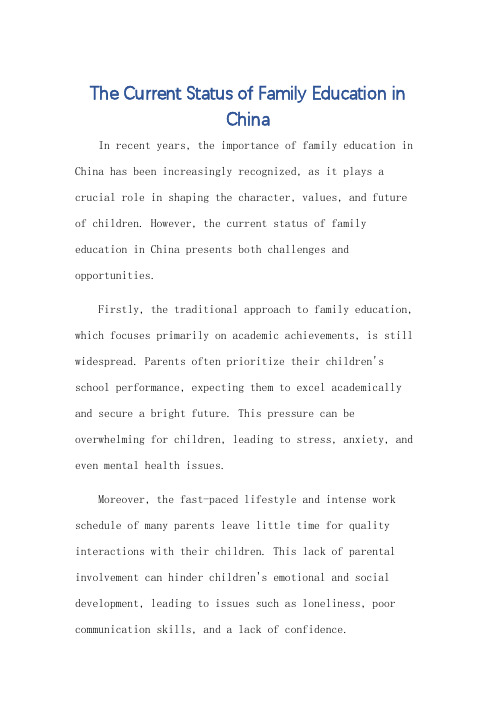
The Current Status of Family Education inChinaIn recent years, the importance of family education in China has been increasingly recognized, as it plays a crucial role in shaping the character, values, and future of children. However, the current status of family education in China presents both challenges and opportunities.Firstly, the traditional approach to family education, which focuses primarily on academic achievements, is still widespread. Parents often prioritize their children's school performance, expecting them to excel academically and secure a bright future. This pressure can be overwhelming for children, leading to stress, anxiety, and even mental health issues.Moreover, the fast-paced lifestyle and intense work schedule of many parents leave little time for quality interactions with their children. This lack of parental involvement can hinder children's emotional and social development, leading to issues such as loneliness, poor communication skills, and a lack of confidence.Despite these challenges, there are also signs of positive change. More and more parents are beginning to recognize the importance of a balanced approach to family education. They are emphasizing the development of their children's character, values, and life skills alongside academic achievements.Parents are also becoming more aware of the need for emotional support and companionship. They are making an effort to spend more quality time with their children, listening to their thoughts and feelings, and providing emotional support and encouragement.In addition, there is a growing trend towards collaborative family education. Parents are realizing that they cannot educate their children alone. They are seeking partnerships with schools, communities, and other parents to provide a comprehensive and holistic education for their children.In conclusion, the current status of family educationin China presents both challenges and opportunities. While the traditional focus on academic achievements and lack of parental involvement remain issues, there is a growingrecognition of the need for a balanced and comprehensive approach to family education. With more parents realizing the importance of emotional support, companionship, and collaboration, the future of family education in China looks promising.**中国家庭教育的现状**近年来,中国家庭教育的重要性日益得到认可,因为它在塑造孩子的性格、价值观和未来方面起着至关重要的作用。
《2024年基于文化视角的中美家庭教育比较研究》范文

《基于文化视角的中美家庭教育比较研究》篇一一、引言家庭教育是每个国家、每个文化的重要组成部分,对于个体成长和社会发展具有深远影响。
本文以中美两国为例,从文化视角出发,对两国的家庭教育进行深入的比较研究。
通过对家庭教育的观念、方式、环境等因素的对比分析,以期为家庭教育的发展提供参考。
二、中美家庭教育观念的差异1. 中国家庭教育的观念中国文化注重家庭观念,强调家庭和睦、尊老爱幼。
因此,中国家庭教育的观念主要体现在培养孩子的道德品质、责任感和家庭观念等方面。
家长通常以言传身教的方式,将传统文化和价值观传递给下一代。
2. 美国家庭教育的观念与中国文化不同,美国文化更加强调个人主义和自由。
因此,美国家庭教育的观念主要体现在培养孩子的独立性、创造力和批判性思维等方面。
家长通常通过鼓励孩子探索、尝试和实践,来培养他们的自信心和自主能力。
三、中美家庭教育方式的差异1. 中国家庭教育的方式中国家庭通常采用严厉与慈爱相结合的教育方式,重视孩子的学业成绩和品行修养。
家长在教育过程中强调纪律性,通过规范行为和惩罚机制来培养孩子的道德观念和自律能力。
此外,中国家长还非常重视孩子的情感沟通,关心孩子的内心世界。
2. 美国家庭教育的方式美国家庭通常采用鼓励与支持的教育方式,注重培养孩子的自信心和自主能力。
家长在教育过程中更加强调平等、尊重和信任,通过与孩子进行开放式的沟通,鼓励他们表达自己的想法和感受。
此外,美国家长还非常重视培养孩子的实践能力,鼓励他们参与各种社会活动和体育运动。
四、中美家庭教育环境的差异1. 中国家庭教育环境中国家庭教育环境受到传统文化和现代生活方式的双重影响。
在家庭教育中,家长通常承担着重要的角色,为孩子提供学习资源、生活保障和心理支持。
此外,学校、社区等社会资源也为家庭教育提供了有力的支持。
2. 美国家庭教育环境美国家庭教育环境更加开放和多元。
家庭、学校、社区等社会资源相互支持,共同为孩子的成长提供良好的环境。
Unit 7 中国式家庭教育与国外家庭教育的区别
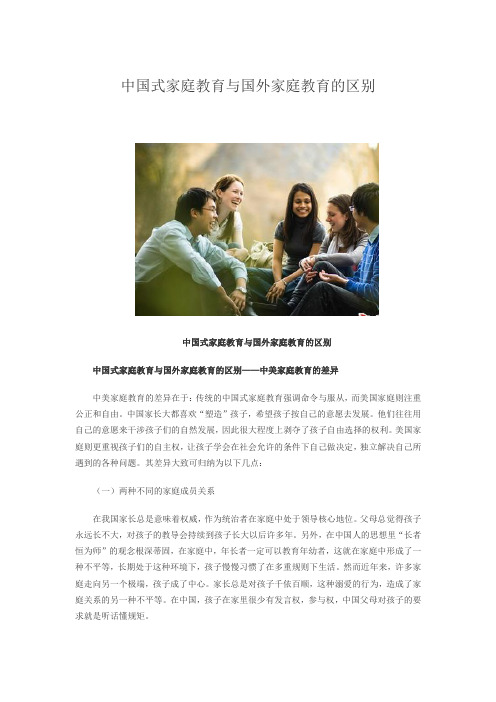
中国式家庭教育与国外家庭教育的区别中国式家庭教育与国外家庭教育的区别中国式家庭教育与国外家庭教育的区别——中美家庭教育的差异中美家庭教育的差异在于:传统的中国式家庭教育强调命令与服从,而美国家庭则注重公正和自由。
中国家长大都喜欢“塑造”孩子,希望孩子按自己的意愿去发展。
他们往往用自己的意愿来干涉孩子们的自然发展,因此很大程度上剥夺了孩子自由选择的权利。
美国家庭则更重视孩子们的自主权,让孩子学会在社会允许的条件下自己做决定,独立解决自己所遇到的各种问题。
其差异大致可归纳为以下几点:(一)两种不同的家庭成员关系在我国家长总是意味着权威,作为统治者在家庭中处于领导核心地位。
父母总觉得孩子永远长不大,对孩子的教导会持续到孩子长大以后许多年。
另外,在中国人的思想里“长者恒为师”的观念根深蒂固,在家庭中,年长者一定可以教育年幼者,这就在家庭中形成了一种不平等,长期处于这种环境下,孩子慢慢习惯了在多重规则下生活。
然而近年来,许多家庭走向另一个极端,孩子成了中心。
家长总是对孩子千依百顺,这种溺爱的行为,造成了家庭关系的另一种不平等。
在中国,孩子在家里很少有发言权,参与权,中国父母对孩子的要求就是听话懂规矩。
美国家长更注重与孩子自由平等的相处。
在孩子小时候就尊重他,重视给孩子个人自主权,让孩子学会在社会允许的条件下自己做决定,独立解决自己所遇到的各种问题。
他们把孩子看做独立个体平等对待,给孩子尊重和理解。
让孩子在家里有发言权、参与权,美国父母鼓励孩子有独立的合理思想;美国孩子有选择权,美国父母在孩子的有了初步的认知能力时,就很重视让孩子自己去进行选择,作出决定,他们可以选择自己喜欢的音乐,图书,游戏,长大以后自己选择朋友,自己选择职业、自己选择婚姻对象等等。
美国父母大多不会替孩子选择,他们主要是引导孩子怎样进行选择,或者站在孩子的身后,给孩子信心,鼓励孩子。
所以,孩子有独立的时间和空间去自由的想像或进行创造性活动(二)两种不同的育儿观中国家庭很重视孩子将来是否有出息,能否找个好工作。
国内家庭教育现状英语作文

国内家庭教育现状英语作文全文共3篇示例,供读者参考篇1The Current Situation of Domestic Family Education in ChinaIntroductionFamily education plays a crucial role in shaping the growth and development of children. In China, traditional family values have always placed a strong emphasis on education, and parents are seen as the primary educators for their children. However, with the rapid changes in society and the increasing pressures faced by families, the landscape of domestic family education in China is constantly evolving. This article aims to explore the current situation of domestic family education in China, highlighting both the strengths and challenges faced by families in this aspect.The Strengths of Domestic Family EducationOne of the key strengths of domestic family education in China is the strong emphasis placed on academic achievement. Chinese parents are known for their high expectations of their children's academic performance and are willing to investsignificant time and resources in their education. This emphasis on education has led to a high level of academic success among Chinese students, with many excelling in international assessments such as the PISA test.In addition to academic success, Chinese families also prioritize the moral and ethical development of their children. Traditional values such as filial piety, respect for elders, and a strong work ethic are instilled in children from a young age. Parents often serve as role models for their children, teaching them important life skills and values through their actions and behaviors.Challenges Faced by Domestic Family EducationDespite the strengths of domestic family education in China, there are also various challenges that families face in this aspect. One of the key challenges is the increasing pressure on children to excel academically. The competitive nature of the education system and the emphasis on standardized testing can lead to high levels of stress and anxiety among children. This pressure can have negative implications for children's mental health and well-being.Another challenge faced by families in China is the changing dynamics of the modern family. With the rise of dual-incomehouseholds and the increasing influence of technology, parents may have less time and energy to dedicate to their children's education. This can result in a lack of communication and bonding between parents and children, affecting the quality of family education.Solutions and RecommendationsTo address the challenges faced by domestic family education in China, it is important for parents to strike a balance between academic success and overall well-being. Parents should focus on creating a supportive and nurturing home environment for their children, where open communication and emotional support are prioritized. Encouraging children to pursue their interests and talents, rather than solely focusing on academic achievements, can also help promote their holistic development.Furthermore, it is essential for parents to prioritize their own well-being and mental health, as happy and healthy parents are better equipped to support their children's growth and development. Finding ways to manage stress and create a healthy work-life balance can benefit both parents and children in the long run.ConclusionIn conclusion, the current situation of domestic family education in China is characterized by a strong emphasis on academic achievement and traditional values. While Chinese families have many strengths in this aspect, they also face challenges such as academic pressure and changing family dynamics. By prioritizing holistic development, open communication, and emotional support, parents can create a nurturing environment for their children to thrive. It is essential for families to adapt to the changing societal landscape and find a balance between academic success and overall well-being in order to support the growth and development of future generations.篇2The Current Situation of Family Education in ChinaFamily education is an essential part of a child's upbringing and plays a crucial role in shaping their character, values, and behavior. In China, with the rapid economic development and social changes, the landscape of family education has also been evolving. In this article, we will explore the current situation of family education in China and its impact on children.Firstly, traditional values and Confucian teachings still hold significant influence in Chinese family education. Respect for elders, filial piety, and emphasis on academic success are deeply ingrained in Chinese culture and passed down from generation to generation. Parents often place a strong emphasis on academic achievement and strict discipline to ensure their children's success in the competitive education system.However, as society modernizes, there is a shift towards more liberal and progressive parenting styles. Many parents are now focusing on their children's emotional well-being, creativity, and individuality. They encourage their children to pursue their interests, express themselves freely, and explore their potential in various fields. This approach aims to nurture well-rounded individuals who are not only academically successful but also emotionally intelligent and socially competent.In addition, the rise of technology and social media has also had a significant impact on family education in China. With the increasing prevalence of smartphones and the internet, children are exposed to a vast amount of information and influences from a young age. Parents face the challenge of monitoring their children's online activities, setting boundaries, and ensuring they receive a balanced education both online and offline.Moreover, the one-child policy that was in place for several decades has had a profound effect on family dynamics and parenting styles in China. Many children grow up as the center of attention in their families, receiving doting love and high expectations from their parents and grandparents. This sometimes leads to a sense of entitlement and pressure to excel in every aspect of their lives.Despite these challenges, family education in China continues to play a vital role in shaping the next generation of citizens. It is essential for parents to strike a balance between traditional values and modern parenting approaches, ensuring their children receive a comprehensive education that prepares them for the challenges of the future.In conclusion, the current situation of family education in China is a complex interplay of traditional values, modern influences, and societal changes. Parents play a crucial role in guiding their children towards a bright future by providing them with a nurturing and supportive environment that fosters their personal growth and development. By adapting to the evolving landscape of family education, Chinese parents can raisewell-adjusted and successful individuals who contribute positively to society.篇3Family education plays a crucial role in shaping individuals' personalities, values, and behaviors. In China, the traditional concept of family education emphasizes discipline, obedience, and respect for authority. However, in today's rapidly changing society, the landscape of family education in China has undergone significant changes.One of the major challenges facing family education in China is the impact of modernization and urbanization. As more parents migrate to cities in search of better job opportunities, they often leave their children behind in rural areas to be cared for by grandparents or other relatives. This separation can lead to a lack of emotional support and guidance for children, as well as feelings of abandonment and insecurity.Another challenge is the increasing pressure on children to excel academically. With the fierce competition for limited educational resources, many parents push their children to study hard and achieve top grades in order to secure a bright future. This focus on academic success can lead to high levels of stress and anxiety among children, as well as strained relationships between parents and their offspring.Furthermore, the prevalence of technology and social media has also had a significant impact on family dynamics in China. With the rise of smartphones and the internet, many children spend more time on screens than interacting with their family members. This can lead to a lack of communication and bonding within the family, as well as increased isolation and detachment from real-life relationships.Despite these challenges, there are also positive trends in family education in China. More parents are becoming aware of the importance of emotional intelligence, empathy, and communication skills in raising well-rounded individuals. In addition, there is a growing emphasis on holistic development and a balanced approach to education, which includes fostering creativity, critical thinking, and life skills in children.In conclusion, the landscape of family education in China is undergoing significant changes in response to the challenges of modernization, urbanization, and technological advancements. While there are still traditional values and practices that influence family dynamics, there is also a growing awareness of the importance of emotional well-being, communication, and holistic development in raising children. By addressing thesechallenges and building on the positive trends, Chinese families can continue to adapt and thrive in an ever-changing society.。
- 1、下载文档前请自行甄别文档内容的完整性,平台不提供额外的编辑、内容补充、找答案等附加服务。
- 2、"仅部分预览"的文档,不可在线预览部分如存在完整性等问题,可反馈申请退款(可完整预览的文档不适用该条件!)。
- 3、如文档侵犯您的权益,请联系客服反馈,我们会尽快为您处理(人工客服工作时间:9:00-18:30)。
To solve these problems is a big project.
We have a long way to go!
精品课件
Thank You!
精品课件
nd wrong activities leading
精品课件
One-child families become more and
more
Parents'busy work
Chinese educational system
Chinese traditional idea
Not all parents'personal qualities
精品课件
精品课件
Chinese Family Education
精品课件
精品课件
• Family • parents
• society)
→ the first school → the first teacher
Family first place
the
first unit
精品课件
The Significance of Family Education
Family education is very important in students' development and it is not only the basis, extension and supplement of elementary education, but also is of irreplaceable special role and meaning for schools and social education.
精品课件
However,many Chinese parents neglect the importance of family education and use wrong ways to educate children.
精品课件
精品课件
The Problems Existing in Chinese Family Education
• Indulgent type of family education • Careless type of family education • Utopian expectation of children's educa
tion • Bringing up by elder generation • Parents' mistake in conception of value a
are high enough
...
精品课件
➢School education should be more comprehensive ➢Reform the educational system ➢Parents'self improvement ➢Learn from American family education ➢Resort to law
